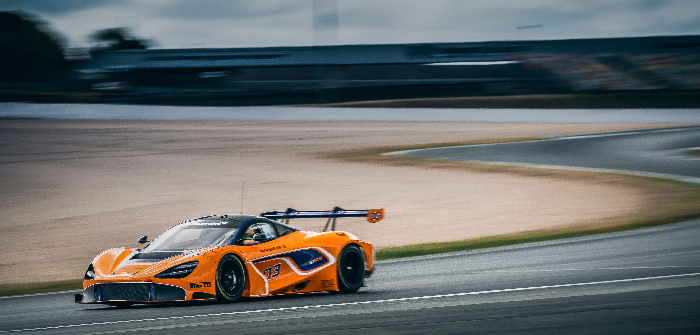Track testing of the first GT race car to be developed by McLaren Automotive’s new customer racing division is underway and will see the McLaren 720S GT3 test extensively across Europe, the US and Middle East.
The new GT3 challenger, which is based on the acclaimed 720S supercar, is being readied for its competition debut in 2019 when it will be eligible for all GT3 grids globally.
The track-based phase of the development program follows extensive computational fluid dynamics (CFD) simulations and incorporates a punishing test regime that will validate key performance data and long-distance durability.
“It was an incredibly exciting moment for us to see our new 720S GT3 begin the intensive track-based phase of a development program that we are confident will provide our customers with a first-class GT race car,” said Mike Flewitt, McLaren Automotive CEO.
“Enabling our customers to go racing is integral to the business strategy of McLaren Automotive and we are committed to supplying teams with exceptional GT cars and the world-class support to get the most out of them.”
As with the road car, at the heart of the 720S GT3 is the carbon-fiber MonoCage II chassis structure. A race-prepared version of the M840T 4.0-liter twin-turbo V8 engine provides the power.
All design and development work thus far has been undertaken within a new dedicated GT race facility at McLaren Automotive in Woking, Surrey, where all new GT3 cars will be hand-assembled.
The first two development cars have embarked on the extensive, physical test program, which will initially use tracks on both sides of the Atlantic, followed by an intensive Middle East program before the end of the year.
Development targets for the 720S GT3 center not just on speed and stability but also on making the performance accessible for drivers of all abilities, as well as a more efficient one for teams to run – both financially and from a serviceability perspective.
Optimized fuel efficiency and tire management have been prioritized, together with improved reliability, durability and serviceability – both in race conditions and between events.
Working closely with technical tire partner Pirelli, the team of GT race engineers from McLaren are running parallel durability and performance programs covering more than 18,500 miles, with various 24- and 36-hour tests being completed by multiple race prototype cars.
“The McLaren 720S is such a multi-talented road car that we always knew honing its pure racing talents and making a GT3 car out of it would be an entirely natural process – and so it has been. While largely a bespoke machine, the GT3 car is still a McLaren 720S at its core. Developing a race car is about optimizing every component and the lightweight MonoCage II carbon-fiber chassis is the perfect base for this,” said Dan Walmsley, motorsport director, McLaren Automotive.



